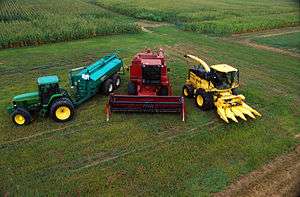Agribusiness
Agribusiness is the business of agricultural production. The term is a portmanteau of agriculture and business and was coined in 1957 by John Davis and Ray Goldberg.[1] It includes agrichemicals, breeding, crop production (farming or contract farming), distribution, farm machinery, processing, and seed supply, as well as marketing and retail sales. All agents of the food and fiber value chain and those institutions that influence it are part of the agribusiness system.

Within the agriculture industry, "agribusiness" refers to the range of activities and disciplines encompassed by modern food production. There are academic degrees specializing in agribusiness, departments of agribusiness, agribusiness trade associations, and agribusiness publications.
In the context of agribusiness management in academia, each individual element of agriculture production and distribution may be described as agribusinesses. However, the term "agribusiness" most often emphasizes the "interdependence" of these various sectors within the production chain.[2]
Among critics of large-scale, industrialized, vertically integrated food production, the term agribusiness is used negatively, synonymous with corporate farming. As such, it is often contrasted with smaller family-owned farms.
Examples
Agribusinesses include seed and agrichemical producers like Dow AgroSciences, DuPont, Monsanto, and Syngenta; AB Agri (part of Associated British Foods) animal feeds, biofuels, and micro-ingredients, ADM, grain transport and processing; John Deere, farm machinery producer; Ocean Spray, farmer's cooperative; and Purina Farms, agritourism farm.
As concern over global warming intensifies, biofuels derived from crops are gaining increased public and scientific attention. This is driven by factors such as oil price spikes, the need for increased energy security, concern over greenhouse gas emissions from fossil fuels, and support from government subsidies. In Europe and in the US, increased research and production of biofuels have been mandated by law.[3]
Studies and reports
Studies of agribusiness often come from the academic fields of agricultural economics and management studies, sometimes called agribusiness management.[2] To promote more development of food economies, many government agencies support the research and publication of economic studies and reports exploring agribusiness and agribusiness practices. Some of these studies are on foods produced for export and are derived from agencies focused on food exports. These agencies include the Foreign Agricultural Service (FAS) of the U.S. Department of Agriculture, Agriculture and Agri-Food Canada (AAFC), Austrade, and New Zealand Trade and Enterprise (NZTE).
The Federation of International Trade Associations publishes studies and reports by FAS and AAFC, as well as other non-governmental organizations on its website.[4]
In their book A Concept of Agribusiness[1], Ray Goldberg and John Davis provided a rigorous economic framework for the field. They traced a complex value-added chain that begins with the farmer's purchase of seed and livestock and ends with a product fit for the consumer's table. Agribusiness boundary expansion is driven by a variety of transaction costs.
See also
- Agrarian law
- Agrarian reform
- Agricultural machinery industry
- Agricultural marketing
- Agricultural value chain
- Agroecology
- Biofuel
- Contract farming
- Energy crop
- Environmental impact of agriculture
- Factory farming
- Industrial agriculture
- Land banking
Notes and references
- Davis, John H.; Goldberg, Ray A. (1957). A Concept of Agribusiness. Division of Research, Graduate School of Business Administration, Harvard University.
- Ng, Desmond; Siebert, John W. (2009). "Toward Better Defining the Field of Agribusiness Management" (PDF). International Food and Agribusiness Management Review. 12 (4).
- "Backpedaling on Biofuels". Wild.org. 2008-08-01. Archived from the original on 2012-09-19. Retrieved 2013-05-02.
- "fita.org". fita.org. Retrieved 2013-05-02.
Further reading
| Look up agribusiness in Wiktionary, the free dictionary. |
- John Wilkinson. "The Globalization of Agribusiness and Developing World Food Systems". Monthly Review.
- Gitta, Cosmas and South, David (2012). Southern Innovator Magazine Issue 3: Agribusiness and Food Security: United Nations Office for South-South Cooperation. ISSN 2222-9280
- https://web.archive.org/web/20160304034828/http://www.ifama.org/files/IS_Ledesma_Formatted.pdf